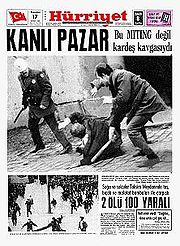.gif)
Bloody Sunday (1969)
Encyclopedia

Left-wing politics
In politics, Left, left-wing and leftist generally refer to support for social change to create a more egalitarian society...
protest that occurred on February 16, 1969, in Istanbul
Istanbul
Istanbul , historically known as Byzantium and Constantinople , is the largest city of Turkey. Istanbul metropolitan province had 13.26 million people living in it as of December, 2010, which is 18% of Turkey's population and the 3rd largest metropolitan area in Europe after London and...
's Beyazıt Square, Turkey
Turkey
Turkey , known officially as the Republic of Turkey , is a Eurasian country located in Western Asia and in East Thrace in Southeastern Europe...
. A coup d'état in 1960 had allowed a group of Turkish military officers to take control of the country. Under this established government, labor tensions grew and anti-American sentiment rose. Elements of the Turkish left and labour movement were protesting against perceived American Imperialism
Imperialism
Imperialism, as defined by Dictionary of Human Geography, is "the creation and/or maintenance of an unequal economic, cultural, and territorial relationships, usually between states and often in the form of an empire, based on domination and subordination." The imperialism of the last 500 years,...
.
Protests increased after the United States Sixth Fleet arrived in Turkey. Unrest peaked on February 16, 1969, when 30,000 people marched on Taksim Square
Taksim Square
Taksim Square situated in the European part of Istanbul, Turkey, is a major shopping, tourist and leisure district famed for its restaurants, shops and hotels. It is considered the heart of modern Istanbul, with the central station of the Istanbul Metro network...
. The demonstration was broken up by the police, but several thousand continued the march towards Taksim. It was at this point that a counter-revolutionary force attacked a large group of these protesters with knives and sticks. During this confrontation, two protesters, Ali Turgut and Duran Erdogan, were killed. Feroz Ahmad, a prominent Egyptian Turkey expert , refers to Bloody Sunday as "an example of organized, fascist violence", alluding to right wing
Right-wing politics
In politics, Right, right-wing and rightist generally refer to support for a hierarchical society justified on the basis of an appeal to natural law or tradition. To varying degrees, the Right rejects the egalitarian objectives of left-wing politics, claiming that the imposition of equality is...
elements responsible for most of the violence.
Left
Democratic Left Party (Turkey)
The Democratic Left Party is a Turkish political party founded on November 14, 1985, by Rahşan Ecevit.-1985-1999:The DSP, a social democratic oriented party, was registered on November 14, 1985 by Rahşan Ecevit, wife of Bülent Ecevit, as he was banned from political life after the 1980 coup...
-right
Nationalist Movement Party
The Nationalist Movement Party , is a far-right political party in Turkey.In the 2002 general elections, the party had lost its 129 seats as it had won only 8.34% of the national vote...
political tensions ran high for most of the 1960s and 1970s. Similar attacks on labor groups by right wing elements in the government and Turkish politics occurred in 1971 and 1977. The 1977 massacre
Taksim Square massacre
The Taksim Square massacre relates to the incidents on 1 May, 1977, the international Labour Day on Taksim Square in Istanbul, Turkey.-Background:...
is referred to as Turkey's "second Bloody Sunday".

